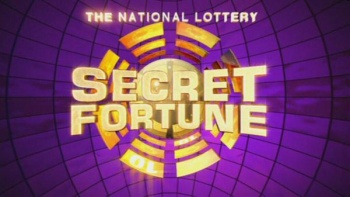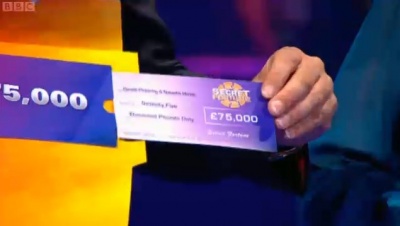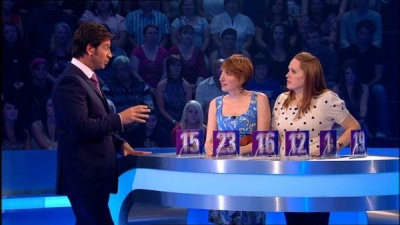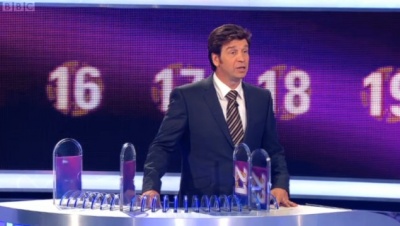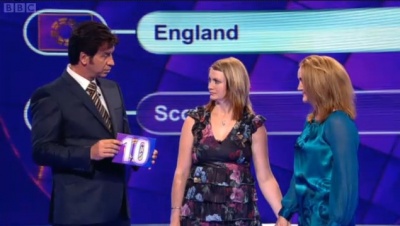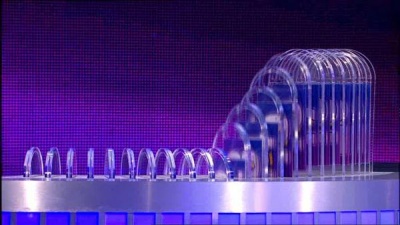Secret Fortune
Contents |
Host
Broadcast
Wild Rover and BBC Northern Ireland for BBC One, 12 February 2011 to present
Synopsis
The inevitable hybrid of Deal or No Deal-style elimination game and In It to Win It-style multiple choice quizzery. A set of cheques in sealed envelopes are eliminated one by one and the last one contains the player's "secret fortune".
We start with 24 envelopes, each containing a ceremonial cheque made out to the players for one of 24 sums ranging from £100 to £100,000. Rather like Deal or No Deal, the precise location of each individual amount is unknown, only to be revealed as each envelope is eliminated from the game.
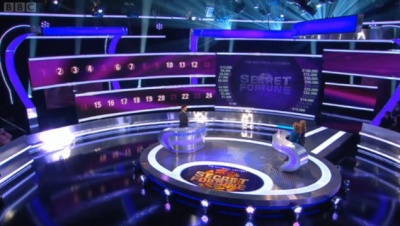 The long screens indicate which envelopes remain to be selected, while the screen on the right displays the amounts left in play.
The long screens indicate which envelopes remain to be selected, while the screen on the right displays the amounts left in play.The first part of the show reduces the 24 envelopes to six through a series of multiple-choice questions. For each question, the players select four numbered envelopes to put into play. They are then given a "put these things in the right order" question, though they don't have to put them all in order, just decide which one is the "top" answer (e.g. which of four films grossed most at the box office, or which football team has won the FA cup the most times). Each answer is associated with an envelope, with the top answer being associated with the highest value, the second-top associated with the next highest, and so on. Three envelopes are rejected, one at a time, with Nick revealing what is in each envelope as it is dumped. The final selected envelope is placed on the rack in front of the players, unopened.
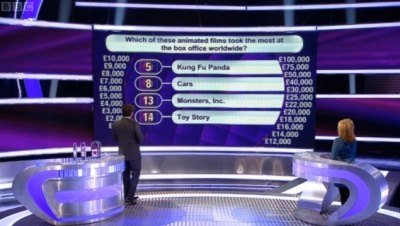 A typical question. On the left, the four envelopes in play stick up from the table. Although it's not obvious, there are two players here - one is standing behind the other.
A typical question. On the left, the four envelopes in play stick up from the table. Although it's not obvious, there are two players here - one is standing behind the other.After six of these questions, six envelopes will have been transferred to the players' table, and eighteen to the bin. At this point, there is a break for the national lottery draws. When we return, it's down to the serious business of reducing the six envelopes to two. This is done in a similar way to the earlier questions, except that now all the remaining envelopes are in play, the questions have the requisite number of possible answers (six if six envelopes are in play... oh, you get it) and the players only have to eliminate one envelope on each question. Since it is now possible for a player with their wits about them to have a pretty good idea of where some of the amounts are, the numbers of the envelopes are no longer displayed next to the answers on screen, but otherwise the same ordering principle applies - top answer, top amount, bottom answer, lowest amount.
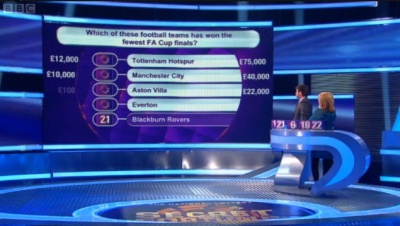 A question with five possible answers, the one selected by the contestants being displayed in reverse video.
A question with five possible answers, the one selected by the contestants being displayed in reverse video.Once we're down to two envelopes, and therefore two sums of money, there is another lottery insert before the end game, which is... well, it's the same as the rest of the game, but with only two envelopes left. This time the contestants are asked to pick the higher answer, and the envelope associated with this contains their (ta-dahhhh!) Secret Fortune. Nick reveals this amount (and for the only time in the show, actually removes the cheque from its pouch), everybody claps politely, roll credits.
While the concept may be something of an 'obvious' derivative of elements that already exist, in fairness this is a solid quizzer with pretty good questions and a clean, elegant format that's as easy to follow as anything similar in the Lotto slot (we still quite can't get our head around the sequence of events in In It to Win It - how does poor old Dale know what to do next?) Anyway, it's an elegant game - get the best six amounts you can into the six envelopes, then try to keep hold of the best of those six envelopes. Luck still plays its part, but there's a very clean cause and effect too.
Criticisms? Maybe a few. That the Chosen Ones arrive on set knowing that they're going home with a bundle of cash is a bit galling for Our Viewer in Cheltenham, and possibly some kind of quick playoff might have been appropriate. What's more, with very few smaller amounts on the board, even a team that plays very badly can still find themselves going home with £3000 to £5000 in cash which seems remarkable given the period of austerity we're supposed to be going through. Think how many BBC cake mornings and executive taxi fares that could buy!
It would have been nice if they could have avoided the all too obvious repetition of catchphrases and ... annoying ... leaving ... big gaps ... between reveals. It's not too unbearable here, but it's still a bit hackneyed if we're honest. And as a final parting shot, it can get a little confusing at the end when there's only two envelopes left - is the envelope they're left with the one they're rejecting or the one they've been left with? Maybe it would've been simpler if they had stopped the game at the previous question, thus avoiding that whole problem.
There's still a lot to like here: Knowles does his usual professional job with a little more sparkle and wit than we see on similar vehicles; most of the questions are fairly pitched and are fun to work out (many having surprising answers); and the graphics package, while not outstanding, does the job very nicely. The set is a bit predictable, but there's a nice envelope selector gadgety thing and that's right up our alley.
A grower in the making, we think.
Catchphrases
Your Secret Fortune tonight will not be...
Inventor
Kieran Doherty and Matthew Worthy

